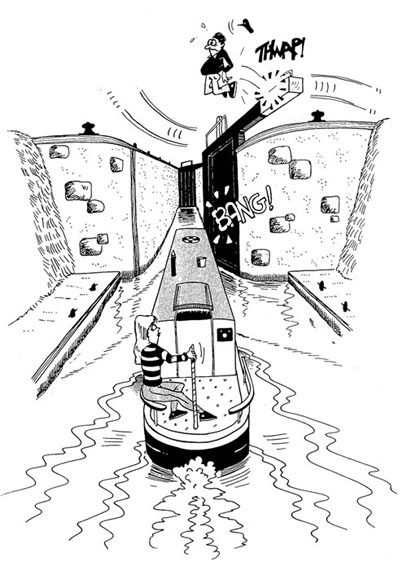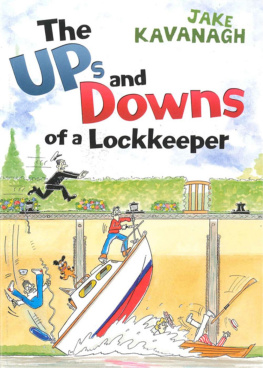Contents
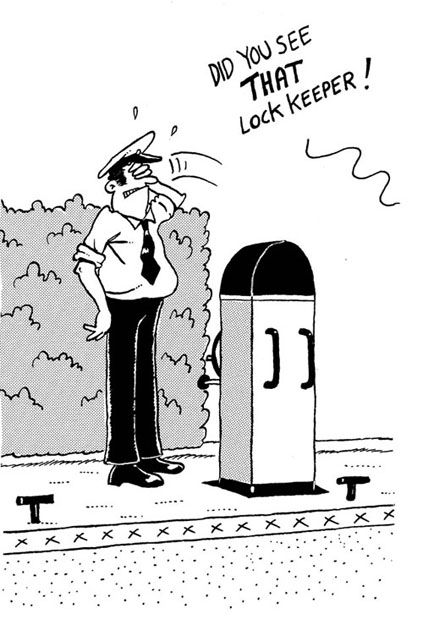
Passer-by: Excuse me, but do you need a degree in hydrology to be a lockkeeper?
Keeper: No sir. Just a sense of humour!
Anyone who has ever enjoyed messing around in boats may well have had to use a lock at some time. Locks come in all shapes and sizes, from tiny brick-lined affairs on narrow-beamed canals, to state of the art concrete jobs at bustling high tech marinas. But they all have one thing in common. If they can catch you out, they will.
It isnt just the novices who come unstuck either. Marine mishaps can plague the best of us, and a lock, with its lack of room and milling fleet of potential targets, does tend to shorten the odds.
The hordes of sightseers who come to watch the antics of boaters give no applause for skilful pilotage. You can guide the boat into the chamber as though she were mounted on rails, dock her without even squeezing the fenders, and lasso a distant bollard with a casual flick of the wrist, and they will be totally unimpressed. But somersault off the fordeck in your designer yachtwear and plummet into the murky water below, and they will positively love you.
For several enjoyable years I worked as a relief keeper on the River Thames, moving between ten locks on one of the busiest sections of this scenic waterway. Almost inevitably, at the end of the season there were countless stories to be told by the keepers who had locked through nearly one million boats between them. This book is a collection of the best of these stories, most of them first hand and all of them true. It may seem like a catalogue of chaos to the uninitiated, but as regular boaters will know, when things are going well, using a lock is all part of the fun. But when things go wrong, there is always someone watching
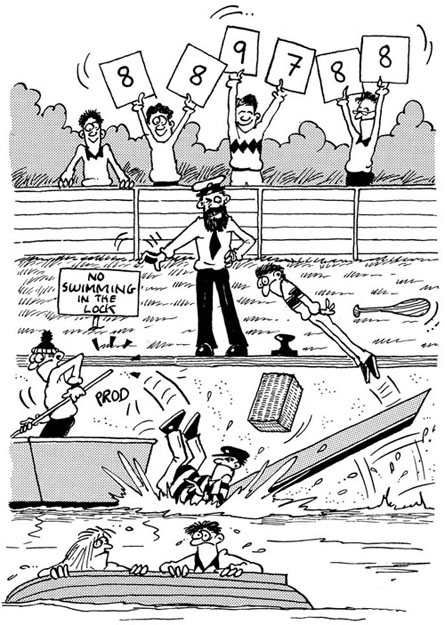
1
A lock assistant was hailed by a student on a narrowboat. Im afraid weve lost a pair of glasses overboard, she said. Theyre very expensive, so when you let the water out, can you drain the lock completely? Then we can walk along the bottom and have a look for them.
What is a lock? In simple terms, a lock is a chamber enclosed between two sets of gates that allows boats to be floated from one level of water to another (see diagram ). In most cases locks will occur singly, but some canals in hilly country will have a whole string of them linked together to form a flight. This prompted an innocent American to comment, Why have all these little locks? Why not put the whole thing on one level and have just one big lock in London?
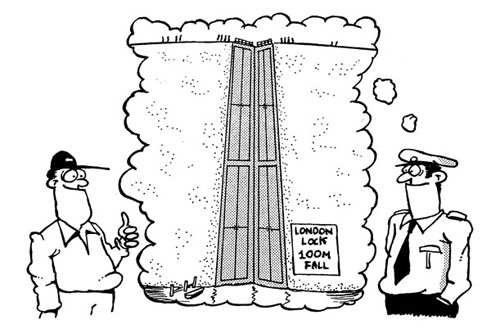
The majority of the locks on the waterway system are user-operated, including the manned ones after hours. The most common mistake made by boaters working a lock themselves is to try to fill the chamber with the lower set of sluices still wide open (they are often left this way to keep the lock empty and so reduce the weed growth on the walls). As a result, the level in the chamber creeps slowly up to the half-way mark and eventually stays there, and after half an hour or so the boater will become a little concerned.
If the lock is manned, he will amble over to the lockkeepers cottage and rap on the door. Murphys Law says that the off-duty keeper will be either having his dinner or having a wash when he is disturbed, and may not always be the source of good humour when the boater solemnly tells him that his lock doesnt work. Equally solemnly, the lockkeeper will ask the boater if he has ever tried filling a bath with the plug out.
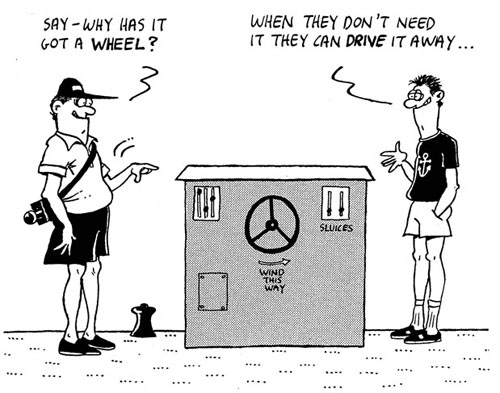
The hand winding mechanism causes occasional confusion
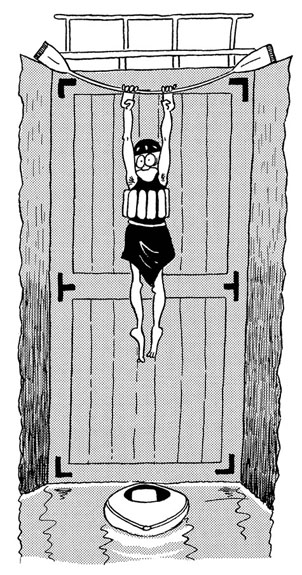
Some locks can be quite narrow and deep
Boaters Spot Test Number One
Lock Nomenclature
During the season, the various parts of a lock are referred to by many different names, some of which are listed below. Test your knowledge by ticking the ones that are correct (the answers are in the diagram at the back of the book).
You should secure your boat to
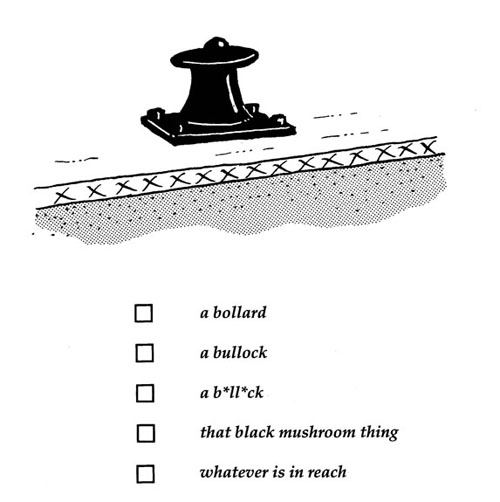
Water is admitted to the chamber by
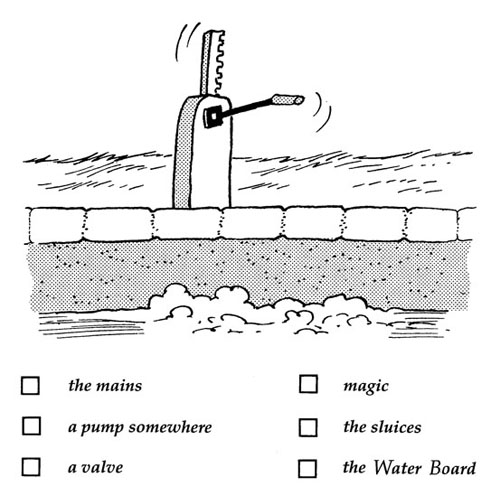
You should address the man in charge as

Sweating in the midday sun, a lockkeeper and his assistant were working hard to try to ease the queues that had grown each side of their lock. The assistant was having a difficult time with the owner of a flybridge cruiser who had stopped halfway down the chamber and was stubbornly refusing to move up.
It gets too rough by the sluices, he said, glaring down from his perch. Youll damage the hull. The assistant was just about to make one last exasperated plea when he was tapped on the shoulder. Excuse me, a rambler asked, but could you tell me why there are locks on this river?
With a totally deadpan face, the assistant simply nodded towards the cruiser.
To annoy the boaters, of course, he replied.

One of the most enjoyable aspects of a lockkeepers job is answering questions, many of which are about the basic operation of the lock itself, although sometimes indirectly. Take the smartly dressed businessman on a hospitality boat that had just moored up in the chamber. Hey, why have we stopped? he asked. Youre in a lock, sir, the keeper replied as he walked towards the sluices.
A what?
The keeper explained what was going to happen: how he was going to let the water out so that the steamer would float down to the lower level. I see, said the businessman. Very clever. Then he began looking around with a frown on his face. So tell me, where is the one you use for going up?
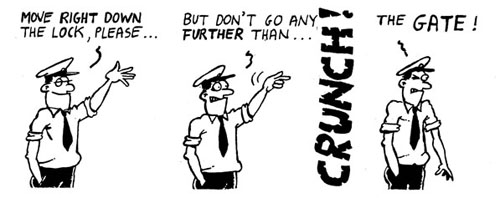
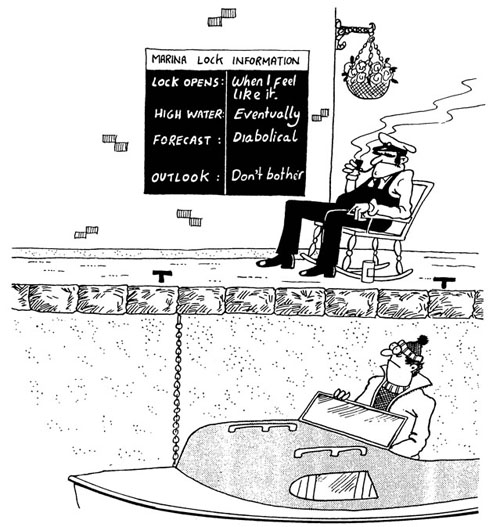
A narrowboat with a family of six aboard ran hard aground behind a weir one evening, so the lockkeeper rowed out to them to offer his assistance. As he probed the riverbed around the hull with a pole, he asked the skipper why he had taken his boat into such an awkward spot.
Well, we were all pretty tired, the skipper explained, and we didnt want to have to work the lock by ourselves. So we thought wed find a way around it
There are several types of lock
